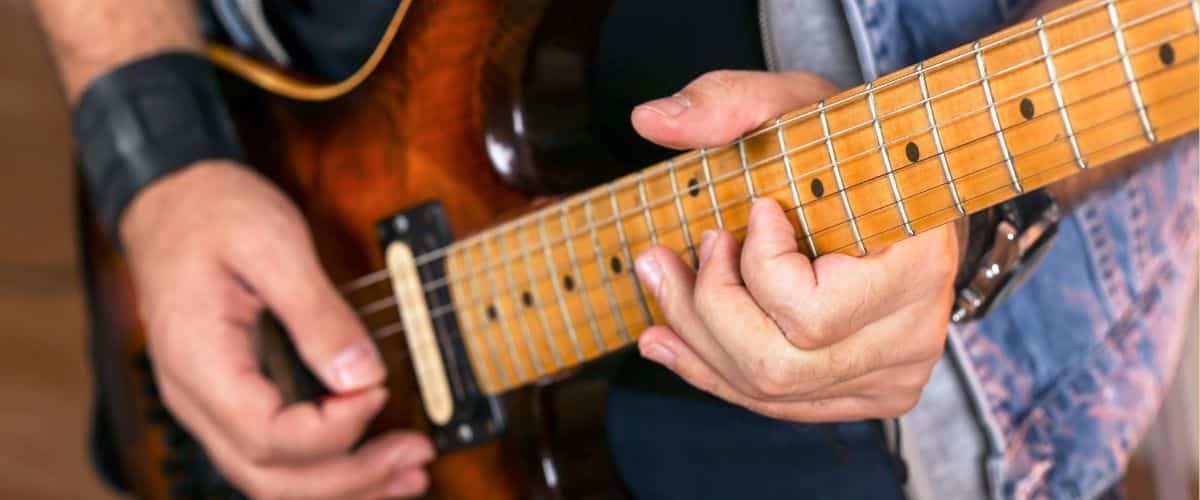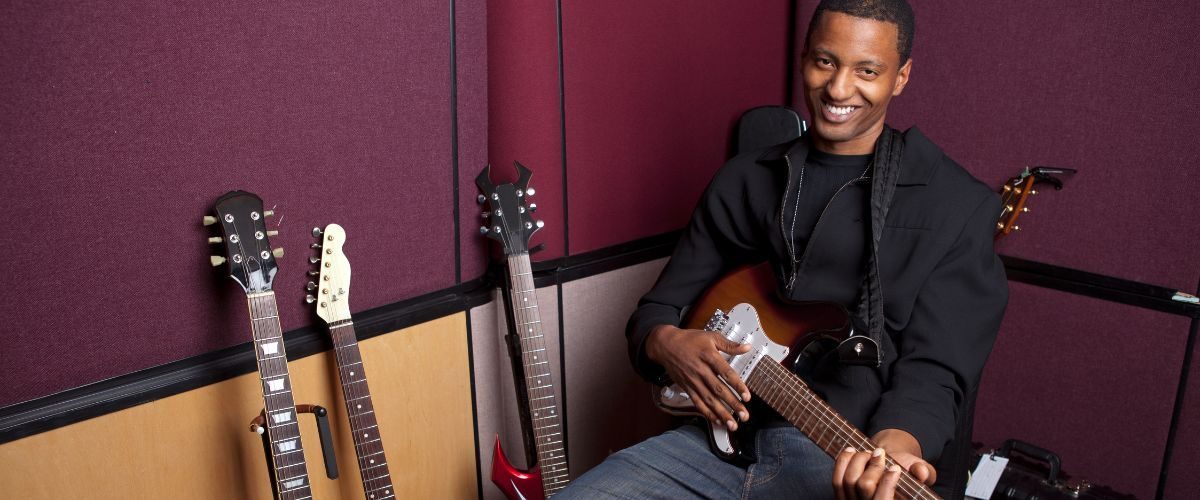
Feeling like a bundle of nerves with stress closing in from all sides?
Imagine if just 30 minutes of shredding on an electric guitar could make that tension vanish into thin air.
A remarkable study from Frontiers in Psychology reveals that electric guitar playing can reduce stress levels by a whopping 20%. More than just making noise, it’s a scientifically proven way to turn that stressful frown upside down.
Unexpected, right? Yet, those sweet riffs could lull you into the best sleep of your life. Why count sheep when you can count beats?
The Science of Stress and Music

Stress is your body’s way of responding to any demand or threat. When you feel threatened, your nervous system releases stress hormones such as adrenaline and cortisol.
These hormones gear you up for emergency action. Your heart pounds faster, muscles tighten, blood pressure rises, breath quickens and your senses become sharper.
Chronic stress can contribute to serious health problems such as heart disease, high blood pressure, diabetes, and other illnesses. According to research by Frontiers in Psychology, activities such as playing the electric guitar can reduce stress levels by 20%.
This stress reduction can improve mood, reduce anxiety, and add years to an individual’s life. The body’s relaxation response kicks in, lowering heart rate and blood pressure and counteracting the effects of stress hormones.
Psychological Effects of Music

Music is more than just a collection of sounds; it has profound psychological impacts on the mind. Listening to or playing music can trigger the release of dopamine, the brain’s reward chemical, which provides a feeling of pleasure.
When individuals play the electric guitar, their brains engage in complex thinking. This encourages the development of neural pathways and increases cognitive functions.
Music therapy is often used to treat mental health issues. Learning and mastering a musical instrument provides a sense of accomplishment and boosts self-esteem. The rhythmic patterns and melodies can help manage depression, reduce anxiety, and support emotional well-being.
By profoundly engaging in playing the electric guitar, people can find an emotional release, making them feel more in control and less stressed.
Research on Electric Guitar Playing and Stress Reduction

Two key focus areas include quantifying stress reduction through scientific methods and analyzing empirical data from recent studies.
1. Quantifying Stress Reduction: In the study published in Frontiers in Psychology, researchers used cortisol levels to measure stress reduction. Participants took part in 30-minute guitar sessions. Researchers observed cortisol levels dropping by a stunning 20% following these sessions.
Heart rate variability (HRV) was another metric to quantify stress reduction. Higher HRV indicates relaxed states, and participants showed improved HRV after playing guitar.
Self-reported questionnaires provided qualitative data, with participants rating dramatic reductions in stress. It’s like magic but with strings attached!

2. Analyzing Empirical Data: The empirical data from Frontiers in Psychology revealed a consistent pattern. Participants of varied backgrounds exhibited reduced stress levels regardless of their musical proficiency, and the data showed that even beginners could benefit.
Surveys included the Perceived Stress Scale (PSS), administered at the study’s start, middle, and end. These surveys provided subjective measures of participants’ stress levels.
Physiological data were gathered through cortisol levels checked via saliva samples. Samples were collected at consistent times to ensure accurate interpretations.

Long-Term Advantages and Considerations

Long-term engagement with the electric guitar presents numerous benefits. Regular practice can improve cognitive function, enhance emotional well-being, and increase creativity. Moreover, mastering new pieces can provide a significant sense of achievement.
However, it’s essential to avoid neglecting other activities. Balance is key. Make sure to complement your guitar playing with different hobbies and commitments. This way, it remains enjoyable and stress-relieving rather than becoming another stressor.
Social activities like joining a band or attending group lessons can enhance the experience. It provides a sense of community and encouragement, making the journey more enjoyable and rewarding.
Overall Electric Guitar Features and Stress Relief

The study’s findings, published in Frontiers in Psychology, are intriguing. Participants who played the electric guitar experienced a significant 20% reduction in stress levels.
It’s not just about the music; it’s about the mental escape. From office workers to students, anyone can benefit from this simple activity.
The study showed that even short sessions of guitar playing produce impressive results. So, there is no need to shred for hours.
Electric guitars aren’t just for rock stars. They can be a tool for daily mental health maintenance.
Using creative outlets is a smart way to handle stress. The electric guitar offers both melody and therapy.
Remember: Play the electric guitar, reduce stress, and have fun!
ABOUT:
Robert Emery created Ted’s List during the lockdown of Covid-19. Aside from entertaining audiences worldwide, he tries to inspire the young musicians of tomorrow. Ted’s List can help enormously with this task, as all the writers are world-class, professional musicians. Ted’s List covers all instruments, from Electric Guitar to Violin and Clarinet. Each instrument has a set of dedicated help articles, giving instructional advice on how to play the instrument, and how to improve. There are also informative reviews based on specific instruments, to help the musician choose the best instrument for them.
MEDIA CONTACT INFORMATION:
All press enquiries go to:
Paul Smith – Head of Press/PR
info (at) teds-list.com


